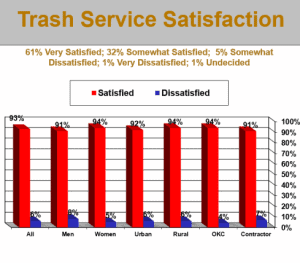

City of Oklahoma City, Oklahoma
Background

The Oklahoma City Environmental Assistance Trust (OCEAT) oversees and funds the City’s solid waste collection and disposal system. A blend of City and private contractor crews perform the residential solid waste and bulk trash collection. The City oversees all residential and some commercial collection activities to customers located in either “urban” or “rural” geographic service areas, called “districts.”
City crews provide urban services to approximately 74,000 customers (40%), not including recycling. The contractor provides all urban services to approximately 100,000 customers (60%). The urban area customers collected by City crews also receive recycling services provided by the same private contractor. In total, approximately 173,000 customers in urban districts receive recycling services. Approximately 16,000 customers are provided rural solid waste services by the private contractor.
Challenge
The City’s collection contract with a private hauling company was set to expire during September 2016. The City wished to evaluate its collection services and disposal options (e.g., single-stream versus dual-stream recycling), evaluate the potential for developing a network of transfer stations to reduce collection costs, and possibly exporting its waste for disposal at more remotely located landfills.
Outcomes and Benefits
SCS evaluated the City’s residential solid waste collection system, including equipment, personnel, routing, maintenance, and costs. By providing the City with comprehensive and actionable results, including the following:
The City successfully completed the procurement of the new collection contract, valued at $20 million/year within their target timeline.
Based on the results and SCS’s recommendation, the City decided to change its recycling program from a dual-stream, once per week to single-stream automated collection, once every other week.
The program implemented July 1, 2018, allows the City to defer proceeding with developing new transfer stations for the near term.
Meanwhile, the City is re-routing its collection system to improve collection efficiencies.